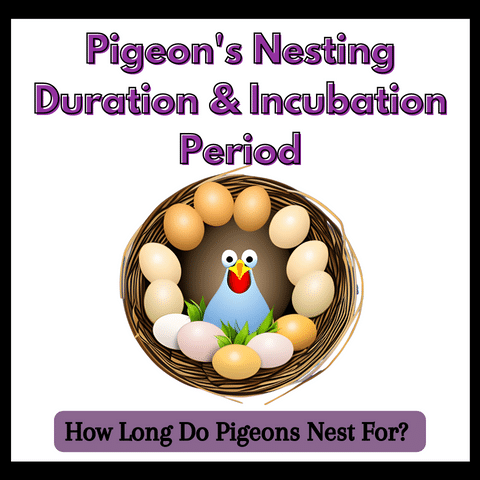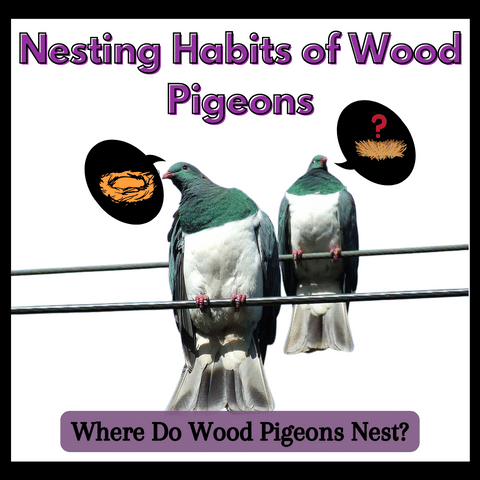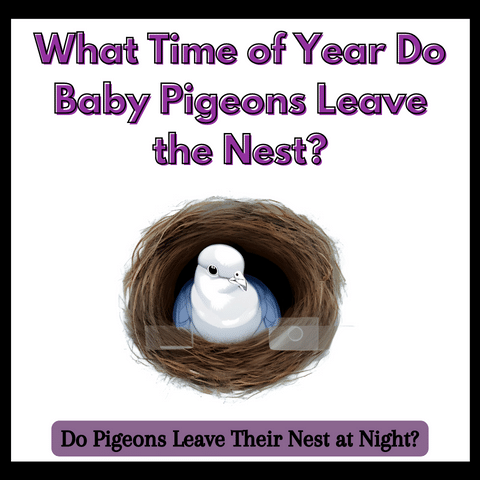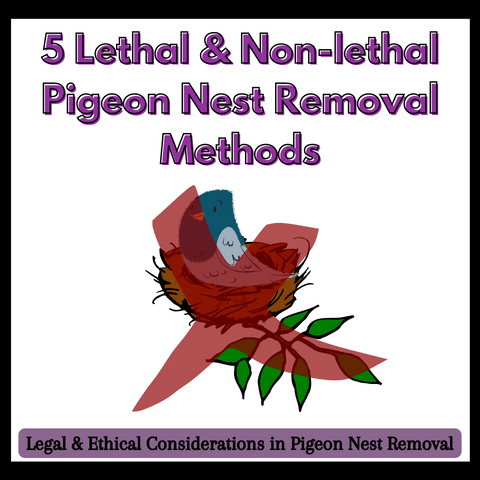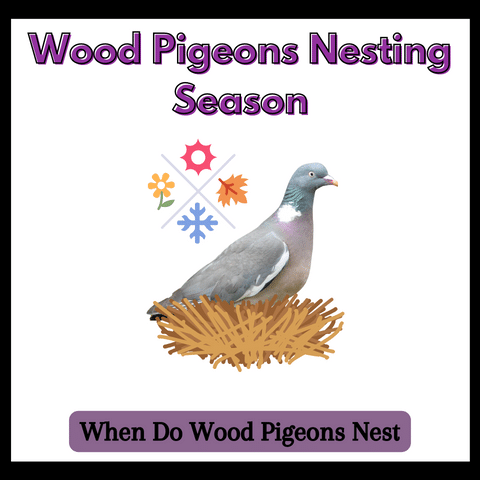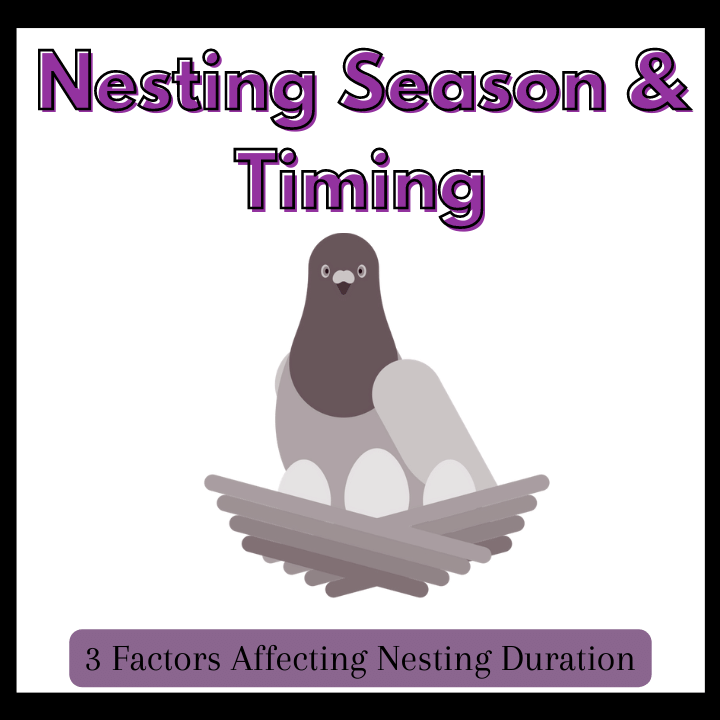When Do Pigeons Nest: Do Pigeons Nest All Year Round?
Well, pigeons are popular for their distinctive cooing sounds & fluttering wings but also for their integrating nesting behavior. Pigeon nesting is a very common site in both urban & rural areas. However, if you want to know ‘When do pigeons nest?’ or want to learn the answer to the question ‘Do pigeons nest all year round,’ this article is for you. In this article, I will discuss ‘When do pigeon nest’ and the answer to the question ‘Do pigeons nest all year round?’. We will also talk about the factors influencing pigeon nesting behavior. But before I tell you all this, let’s begin with knowing when pigeons nest.
When Do Pigeons Nest?

Pigeons, including wood pigeons, can nest at different times depending on the specific species & local climate. However, in general, pigeons tend to breed & nest during the spring & summer months (April-August). During this time, pigeons engage in courtship displays, build nests, lay eggs, & raise their offspring.
The summer & spring months tend to give them an advantage of the warmer weather & longer days, which provide & optimal conditions for raising their young ones as well. However, you should note that the nesting seasons for pigeons may vary depending on individual preferences, climate conditions, weather, & many others.
However, you will find pigeons nesting typically around March or April and extending through the summer months until late August or early September. This is when pigeons will be more active in courtship display and constructing their nest to lay eggs and raise their offspring. But if you want to know more about ‘how pigeon nest,’ consider reading this article.
Besides this, we’ve also shared a proper article on the wood pigeon nesting durations. If you want, check out our other posts on when wood pigeons nest or How Long Do Wood Pigeons Nest For. Coming back to the point, now you know when Pigeons nest. Now it’s time to find the answer: do pigeons nest all year round?
Do Pigeons Nest All Year Round?
No, pigeons do not nest all year round. Although pigeons can breed & nest during different times of the year depending on the species & local climate, they typically have specific breeding seasons rather than nesting throughout the year.
As I told you earlier, Pigeons, including wood pigeons, commonly breed & nest during the spring and summer months when environmental conditions are more favorable for raising their young. Because of the warmer weather and longer days, the reproduction & growth of their offspring tends to be at a high success rate.
However, it is important to know that specific pigeon species & populations may exhibit variations in their breeding patterns and nesting behaviors. Therefore, if we are looking for a specific pigeon nesting season, consider reading my other recent articles on ‘How Long Do Pigeons Nest For. Coming back to the point, in certain regions with mild climates, you will find pigeon breeding & nesting throughout the year, with some variations in activity levels during the nesting season.
Therefore, I highly recommend consulting local burning resources or experts for more precise information on the specific pigeon nesting behavior in your area. Below, I am sharing more in-depth knowledge on pigeon nesting patterns & cycles to help you discover valuable insights on the question, ‘When do pigeons nest?’.
Pigeons Annual Nesting Cycle
First of all, you should know that pigeons are known to follow distinct annual nesting cycles consisting of many several stages. According to the University of Avian researchers, pigeons begin their nesting activities in the early spring because the weather tends to be more favorable & milder when food sources become more abundant.
During this period, pigeons engage in courtship rituals to attract mates. It’s common to find male pigeons performing elaborate displays, including cooing and buffing up their feathers to woo the females & win them. After a successful courtship, they build their nest using materials like twigs, grass, leaves, & any other resourceful nest builders they can find.
To learn more about where pigeons nest in winter, consider reading our recent article on where pigeons nest. Returning to the point, pigeons will generally choose sheltered locations like ledges, building crevices, and tree branches to construct their nest. Once they have completed building their nest, the female will lay one or two eggs at a time.
Occasionally you may find three eggs in a clutch as well. The most intriguing part of pigeons is their responsibility for caring for young ones. Once the females have laid eggs, you will find both parents taking turns to incubate their eggs, with each incubation period lasting around 17-19 days. Once the eggs are successfully hatched, parents feed their chicks with a special secretion called pigeon milk, which is regurgitated from their crop. This milk tends to be a highly nutritious substance that helps the chicks grow rapidly.
Seasonal Nesting Preferences
Even though you might find pigeons engaging in nesting activities throughout the year, they also tend to exhibit seasonal preferences. I found that pigeons tend to have a higher inclination towards nesting during the spring & summer months rather than winter. The longer daylight hours & warmer temperatures during these seasons tend to be the most favorable conditions to raise their young than raising them in harsh cold weather & unfavorable conditions.
During the autumn & winter months, pigeons make nests, but the frequency & intensity will significantly decrease. This is due to the harsh weather conditions like cold weather, strong wind, and snow, making it challenging for the pigeon to find suitable nesting sites and sufficient food/water sources. Therefore, pigeon nesting activity is relatively limited during the autumn & winter months.
Geographical Variations
Another thing you need to know about pigeon nesting behavior is that it varies across geographical locations. After doing hours & hours of research, I found that pigeons living in urban areas tend to nest more frequently than those in rural areas because of the availability of shelter & food supply. The availability of human-made structures and a steady food supply in cities serve as attractive nesting habitats for pigeons.
On the other hand, pigeons living in rural areas often rely on natural nesting sites like cliffs, trees, or barns for proper shelter & protection from predators. But as you can notice the increasing urbanization of rural areas, pigeons are also adapting to nesting in artificial structures in these regions. Below I am mentioning the average period of pigeon nesting across seasons.
| Season | Nest Building | Incubation | Chick Rearing |
| Spring | 7-10 days | 17-19 days | 25-32 days |
| Summer | 7-10 days | 17-19 days | 25-32 days |
| Autumn | 5-7 days | 17-19 days | 20-28 days |
| Winter | 5-7 days | 17-19 days | 20-28 days |
3 Factors Influencing Pigeon Nesting Behavior

Climate & Weather Conditions
As I told you earlier, climate & bad weather conditions are going to play a crucial role in pigeon nesting behavior. Since pigeons prefer nesting when the weather is relatively mild & warmer, you will find them engaging in nesting activity daily during summer & spring months when the temperature range is between 15°c-25°c.
However, they are not active during extreme heat or cold as it disrupts their breeding cycles & affects the survival of their offspring. Also, you should know that pigeons avoid nesting in areas that are prone to heavy rainfall, as it will lead to the destruction of their nest. That strong winds may also make it challenging for pigeons to maintain a stable nest & protect their chicks from being blown away. Below are the weather conditions & the nesting behavior frequency of pigeons in a table format to help you understand better.
| Weather Condition | Nesting Activity |
| Mild & calm | High |
| Extreme heat | Low |
| Heavy rainfall | Low |
| Strong winds | Low |
Availability of Food & Resources
Since pigeons also heavily rely on a steady supply of food to sustain themselves and raise their young, you will often find them nesting in areas with human-provided food sources or natural food sources like seeds, grains, fruits, & insects. Also, you should note that scarcity of food resources significantly affects the pigeon’s ability to support its growing family, ultimately limiting its ability to nest all year round.
Nesting Site Selection
When selecting suitable nesting sites, pigeons tend to be meticulous creatures looking for locations that offer safety, shelter, & accessibility. Pigeons usually go with very easy-access sites, allowing them to fly in and out without much effort. Hence it is not uncommon to witness pigeon nesting on flat surfaces like ledges, forest edges & rooftops that provide ideal platforms for nesting & proximity to food sources and water supply.
3 Implications of Pigeon Nesting
Urban Environments & Nesting
We have seen pigeons living in human-made structures and continuously adapting to urban areas where they find abandoned nesting opportunities. Urban areas tend to be the best place for birds like pigeons to build nests as it provides an array of structures, including buildings, beaches, & statues. These kinds of structures provide them & protection from predators and unfavorable weather conditions.
However, you should also note that the increasing pigeon population in cities also leads to certain challenges like droppings which cause structural damages & health concerns. Their droppings can have harmful bacteria, fungi, & parasites that may cause severe health conditions in humans and other surrounding wildlife. If you want to learn more in-depth about the negative consequences of pigeons living in urban areas, consider reading my recent article on ‘Why Are Pigeon Nests So Bad‘.
Human Interactions & Nesting
You should also note that human activities have significantly impacted our little avian friends’ nesting behavior. The alteration of the natural habitats due to urbanization & the destruction of traditional nesting sites has forced pigeons to adapt to nesting in artificial structures. This proximity to human habitation further leads to various interactions between pigeons & us. We have seen pigeon nesting in buildings causing structural damages as their nest & droppings may clog drainage systems leading to costly repairs or corroding cement, metal & paint works.
After doing hours & hours of research, I discovered that the government spends $10 million annually in urban areas for pigeon-related damages. Therefore< we should work towards effective measures that can be implemented to deter pigeons from nesting in sensitive structures while ensuring their welfare. If you want to know more about how to stop pigeon nesting, consider reading this article. You can learn & read another masterpiece on How to Get Rid of Pigeon Nests if it is in an appropriate site or location.
Conservation & Management
We must understand the pigeon nesting behavior for effective conservation efforts. Before we do anything that may disrupt their nesting site or ecological balance, we must understand the possible consequences of making any changes. Even though pigeons are known to be very ubiquitous, they play a very crucial role in the urban ecosystem as well.
As per my research, pigeons act as a seed dispersal which further aids in the regeneration of plant life. Birds like pigeons are also a key indicator of environmental qualities, as their population changes may reflect a change in the urban environment. However, there are many strategies that we can implement to manage the pigeon population & mitigate potential issues, like using deterrents such as spikes or netting to prevent pigeons from nesting in sensitive areas. To redirect pigeons away from undesirable locations, designated feeding areas establishment can help. Below, I mention the management Strategies for pigeon nesting and its effectiveness.
| Strategy | Effectiveness |
| Deterrents | Moderate |
| Feeding Area Designation | High |
| Nest Removal | Low |
Conclusion
After reading this article, I hope you have all the knowledge regarding the question of when pigeons nest. After knowing ‘when do pigeons nest,’ if you want to know how long pigeons sit in the nest, consider reading this article. Also, if you’re considering pigeon nest removal, I suggest you read my other valuable & resourceful post about What Happens If You Destroy a Pigeon Nest.
As of now, you know that pigeons tend to nest during the spring & summer months, starting from April to August. However, you should note that seasonal changes, climate conditions, food availability, & nesting site preferences may influence their nesting activity & level. I am doing my best to give you in-depth knowledge on the question of ‘When do pigeons nest’ as well as ‘Do pigeons nest all year round?’.
Considering all the factors mentioned here in this post, you can work on effective management strategies that promote coexistence between pigeons & humans. If you have any other concerns regarding the question of ‘When do pigeons nest’ or ‘Do pigeons nest all year around,’ consider sharing them. Your share will help many people learn the duration of pigeon nesting behavior. Apart from this article, I have shared many interesting topics on pigeon nesting behavior. Do check my other helpful guides shared on this website. See you in the next post, till then, take care & goodbye.

